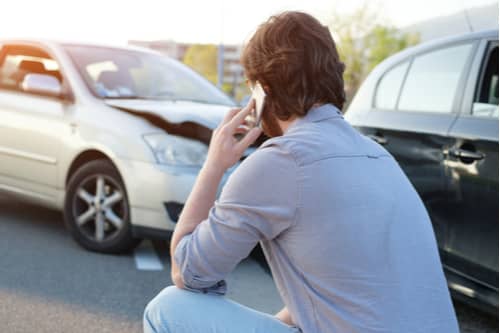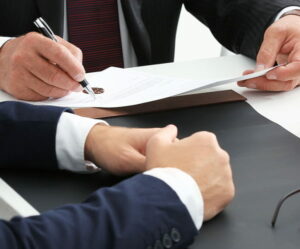Car accidents happen when we least expect them, turning ordinary moments into chaos and confusion. Whether it’s a minor fender bender or a serious collision, the moments that follow a crash are critical. You may be stressed, frightened, or unsure what to do next. It’s completely normal to feel that way. The most important thing is to stay as calm as possible and take the right steps to protect your health, safety, and legal rights.
So, what should you do immediately after a car accident? Let’s walk through the steps in detail so you know exactly what to do if the unexpected happens. Contact an experienced Atlanta car accident attorney for legal assistance.
1. Check for Injuries and Ensure Safety
The first and most urgent step after any car accident is to check whether you or anyone else involved is injured. Your safety and the safety of others come first.
If you are seriously injured, try not to move. Wait for emergency responders to arrive. Moving when you have a neck, back, or head injury can make things worse. If you’re able, check on any passengers in your car and then on others involved in the crash. If someone is unconscious or in pain, call for help immediately and do not attempt to move them unless they’re in immediate danger (like from a fire or traffic hazard).
If you’re in a position to do so safely, move your vehicle out of the way of traffic. Turn on your hazard lights. This helps prevent additional accidents and makes it easier for emergency services to find you. If you can’t move your car, stay inside with your seatbelt fastened until help arrives.
2. Call 911 and Report the Accident
Once everyone is safe, or as safe as possible, call 911. Even for minor accidents, it’s essential to notify law enforcement. A police report can be an important piece of documentation when it comes to insurance claims or potential legal action.
Be honest and calm when speaking to the dispatcher. Give them your exact location, describe the vehicles involved, and let them know if there are injuries.
When the police arrive, cooperate fully. Give them a clear and accurate account of what happened, but avoid guessing or speculating. If you don’t know something, it’s okay to say so. Stick to the facts.
Ask for the police report number and find out how you can obtain a copy later. This will be important if you need to file a claim or seek compensation for damages and injuries.
3. Exchange Information with the Other Driver(s)
While waiting for the police, or once they give the okay, you’ll need to exchange information with the other driver or drivers involved. Be courteous, but don’t apologize or admit fault. Even a simple “I’m sorry” can be misinterpreted as admitting responsibility.
Here’s what you should gather:
- Full name and contact information
- Driver’s license number
- License plate number
- Insurance company and policy number
- Vehicle make, model, and color
If there are witnesses to the accident, ask for their contact information too. Neutral third-party accounts can help clarify what happened if there are disputes later on.
4. Document the Scene
Use your phone to take photos and videos of everything at the scene. These images can serve as crucial evidence for insurance claims or any legal action that may follow.
Capture:
- The position of all vehicles involved
- Damage to all cars (close-up and wide shots)
- Skid marks, broken glass, or debris
- Traffic signs or signals nearby
- Weather and road conditions
- Visible injuries
You may also want to jot down your own recollection of what happened while it’s still fresh in your mind. Include the time, location, what you were doing before the accident, and anything else that stands out.
5. Limit What You Say at the Scene
It’s natural to want to talk things through with the other driver, especially in a stressful situation. But be mindful of what you say. Try to avoid admitting blame or discussing who caused the accident, as these details are best handled by professionals after the facts are reviewed.
Stick to gathering and providing necessary information. If you’re unsure about what to say or how to respond, it’s okay to politely let others know you need time or that you’ll be speaking with an attorney or your insurance company before making any statements.
6. Seek Medical Attention, Even If You Feel Okay
Adrenaline can mask pain. Many injuries, especially whiplash, concussions, or internal injuries, don’t become obvious until hours or even days after the crash.
That’s why it’s crucial to see a doctor as soon as possible, even if you think you weren’t hurt. Getting evaluated right away not only protects your health but also documents the injuries in connection with the accident. If you delay treatment, insurance companies may try to argue that your injuries weren’t related to the crash or weren’t serious enough to warrant compensation.
Pay close attention to any symptoms in the hours and days after your accident, including:
- Headaches
- Dizziness
- Stiffness or pain in the neck or back
- Numbness or tingling
- Trouble concentrating or remembering things
If you experience any of these, go to the ER or urgent care immediately.
7. Notify Your Insurance Company
You’ll need to let your insurance provider know about the accident, even if you weren’t at fault. Most policies require prompt notification of any incidents, and failing to report can cause problems down the line.
Stick to the facts when speaking to your insurer. Let them know:
- When and where the accident happened
- Who was involved
- If there were injuries
- Whether police came to the scene and filed a report
Avoid speculating or assuming blame. It’s okay to say that the investigation is ongoing or that you are still gathering information.
If you receive a call from the other driver’s insurance company, be very cautious. You’re not required to give a statement, and you may want to consult a personal injury attorney before speaking with them in detail.
8. Keep a Record of Everything
From the moment the accident happens, start keeping a file of all documentation. This may include:
- The police report
- Medical records and bills
- Car repair estimates and receipts
- Photos and videos from the scene
- Witness contact information
- Notes from conversations with insurers
Having all of this in one place can make it easier to support your claim and get the compensation you may be entitled to. It also helps your attorney (if you hire one) build the strongest case possible on your behalf.
9. Understand the Emotional Impact
While physical injuries are often more visible, the emotional toll of a car accident can be just as serious. It’s completely normal to feel shaken, anxious, or even depressed after a crash, especially if the accident was traumatic or involved serious injuries.
Some common emotional responses include:
- Trouble sleeping or nightmares
- Anxiety about driving or riding in a car
- Flashbacks or recurring thoughts about the accident
- Mood swings or irritability
- Withdrawal from friends, family, or daily activities
These symptoms can indicate acute stress, post-traumatic stress disorder (PTSD), or emotional trauma. Don’t ignore these feelings. Reach out to a mental health professional if you’re struggling. Getting support early can help you heal emotionally just as much as medical treatment can help you physically.
Remember, healing is not just about your body but your whole self. You deserve compassion, patience, and care during your recovery.
10. Be Cautious with Social Media
In today’s world, it’s second nature to share major life events on social media. But after a car accident, it’s wise to be very careful about what you post online.
Insurance companies and defense attorneys can and often do look at your social media accounts. Posts, photos, and even comments can be taken out of context and used to minimize your injuries or shift blame.
Here are a few things to avoid:
- Discussing the accident or your injuries
- Posting pictures that show you participating in physical activities
- Commenting on or sharing content related to car crashes, lawsuits, or legal matters
Until your case is resolved, it’s best to stay quiet online about anything related to your accident.
11. Consider Speaking with a Personal Injury Attorney
After a car accident, you may be unsure whether you need a lawyer. The truth is, even in seemingly straightforward cases, having an experienced attorney on your side can make a big difference.
A personal injury attorney can help:
- Evaluate whether you have a valid claim
- Gather and preserve evidence
- Deal with insurance companies
- Negotiate for a fair settlement
- File a lawsuit if necessary
Insurance companies often try to settle quickly and for as little as possible. Their goal is to protect their bottom line, not to make sure you’re fully compensated. A skilled attorney knows how to push back and fight for what you truly deserve.
If your accident involved serious injuries, unclear liability, or an uninsured driver, getting legal help is especially important. And in many cases, consultations are free. You can find out your options without any risk.
12. Know Your Rights and Deadlines in Georgia
Every state has its own rules about how long you have to file a personal injury claim after a car accident. In Georgia, the statute of limitations for most car accident injury claims is two years from the date of the crash.
That might sound like a long time, but building a strong case takes time. The sooner you start the process, the better your chances of recovering compensation for:
- Medical expenses
- Lost wages
- Property damage
- Pain and suffering
- Emotional distress
If your claim involves a government agency, like being hit by a city vehicle or injured due to poor road maintenance, there may be shorter notice deadlines, sometimes as little as six months.
An attorney can help you understand these deadlines and ensure you don’t miss your window to act.
13. Focus on Your Recovery
After a car accident, your number one job is to focus on getting better. That means following your doctor’s instructions, keeping your medical appointments, and giving your body the time it needs to heal.
It’s easy to underestimate the toll an accident takes, especially if you’re trying to keep up with work, family responsibilities, or financial stress. But pushing yourself too hard, too soon, can backfire.
Be kind to yourself. Healing is not a straight line. Some days will be better than others, and that’s okay. Surround yourself with people who support your recovery and seek help when you need it, whether it’s from loved ones, medical providers, or legal advocates.
14. Protect Your Future
The steps you take in the hours, days, and weeks after a car accident don’t just affect your current situation; they can impact your future.
Medical bills, missed work, long-term injuries, and emotional trauma can follow you for months or years. That’s why it’s so important to take action early, gather documentation, and seek out support.
Even if you’re unsure about your next steps, you don’t have to go through this alone. There are professionals who care about your well-being and who can help you with the legal, medical, and financial challenges ahead.
Discuss Your Case with Our Trusted Car Accident Lawyer
Being in a car accident is scary. It disrupts your life in an instant and can leave you with pain, stress, and unanswered questions.
At Calvin Smith Law, we understand the confusion and hardship that come after a crash. We’ve helped countless people in the Atlanta area pick up the pieces and move forward with confidence. Our team can guide you through every step of the process, from getting medical care to standing up to the insurance companies.
We know the law. We know Georgia. And most importantly, we know how to fight for you.
You’ve been through enough. Let us take it from here. Contact a personal injury lawyer today at (404) 842-0999 or through our online form for a free consultation, and let’s talk about how we can help you get the compensation and peace of mind you deserve.












